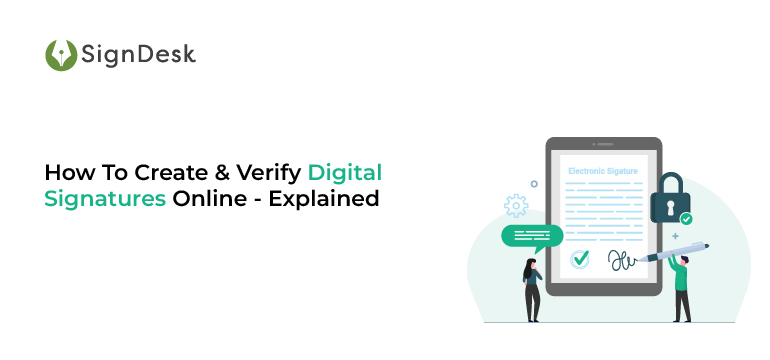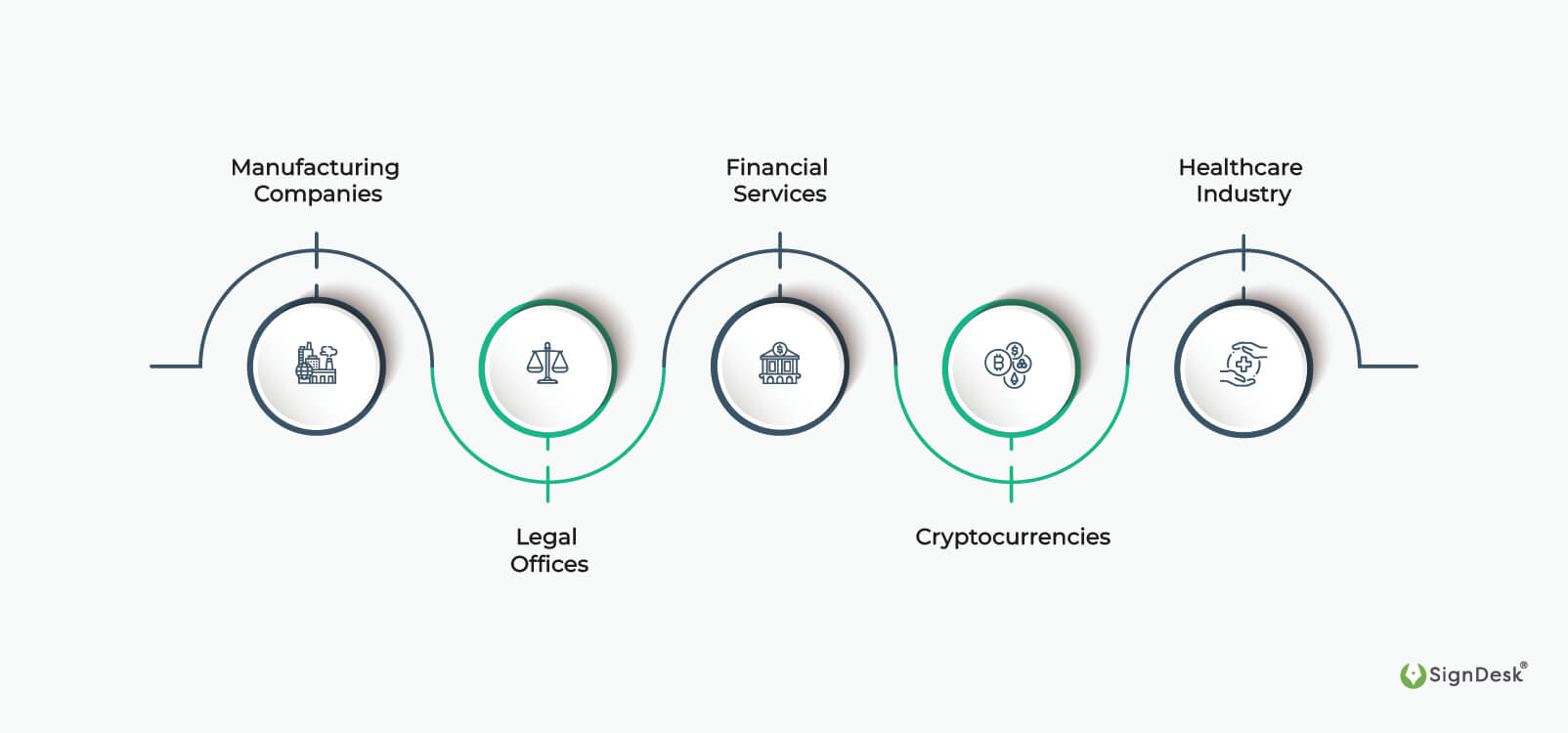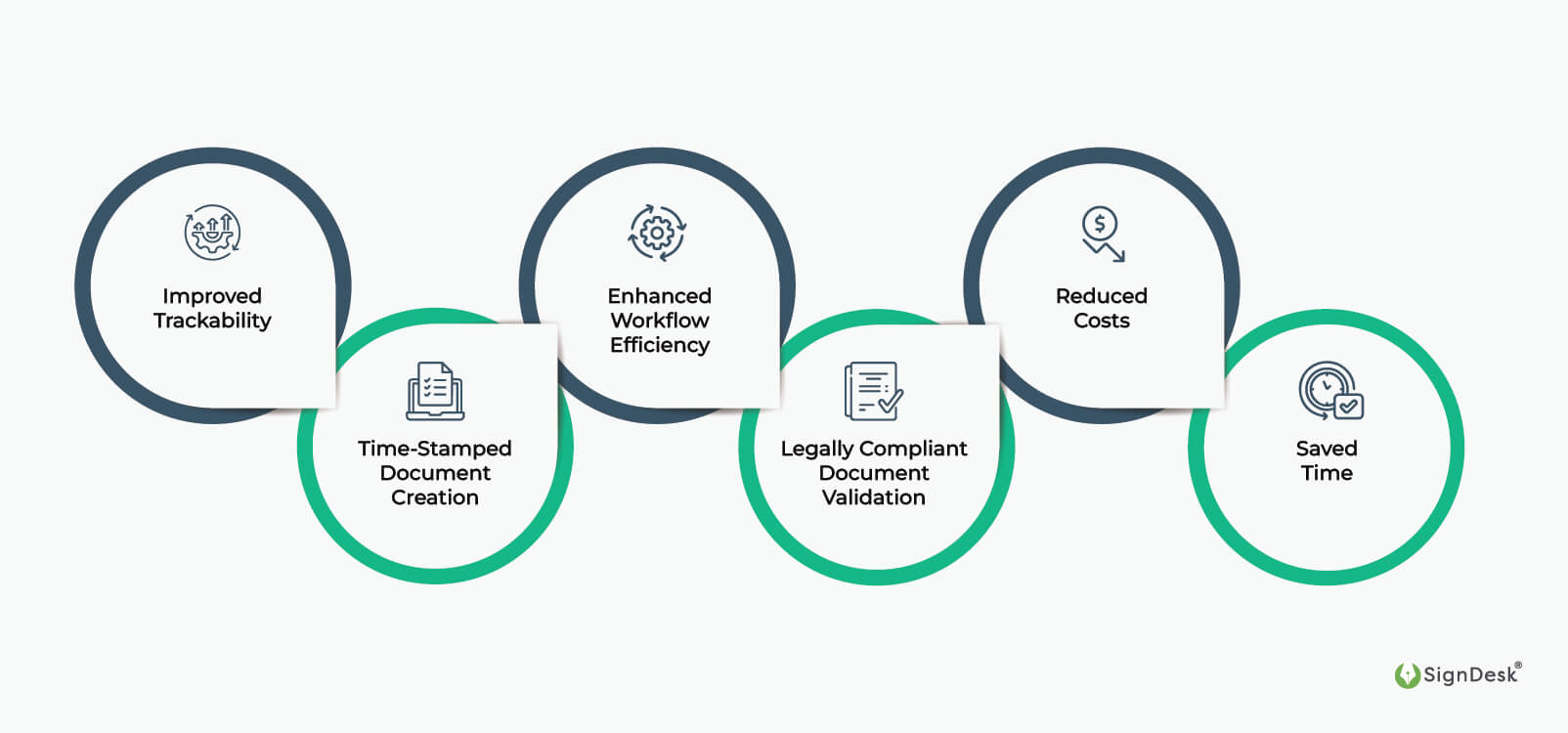
What is Digital Signature?
A digital signature is an online signature facility backed by an e-certificate that provides proof of the signer’s identity. It is a very secure method of digital document approval. Digital signatures use technology such as hashing algorithms, public key cryptography & encryption to secure e-documents.
Online digital signatures specifically leverage Public Key Cryptography technology. The public key algorithm in most digital signatures generates two sets of distinct keys. The pair of keys are mathematically linked & form the private & public key components of a digital signature.
The security capabilities built into digital signatures prevent business documentation from being manipulated. The cryptography security technology ensures the signatures made on a document are legitimate & the record is untampered.
How To Sign PDFs using Digital Signatures
Businesses can quickly get their PDFs digitally signed in minutes by following a few steps. To create a digital signature online, the user must first upload the PDF to be signed on the digital signature software platform.
The software provides a one-way hash, i.e., a string of letters and numbers with a set length produced by an algorithm. The hash and a set of public and private keys are created as part of the Digital Signature Certificate (DSC).
Hashing maps object data to a representative integer value using functions or algorithms. When identifying objects on a specific map, a hash may restrict queries. By hashing a message or document, the information is encrypted and truncated to fit a fixed length.
Businesses obtain DSCs by integrating with a Certifying Authority (CA) authorized by the Comptroller of Certifying Authorities (CCA). The hash helps sign the electronic document. The hashed document is later encrypted using the signer’s private key.
The digitally signed PDF is encrypted during the digital signature online verification process & secured to be tamper-proof. The signer uses a unique digital identity to authenticate their credentials & authorize their signature on the document. The encrypted hash and other details, such as the hashing algorithm, form a digital signature on the PDF.
The digitally signed document is, in essence, uniquely encrypted and may be verified using the public key which corresponds to the private key used for encryption.
How To Verify Digital Signatures
The process of verification of digital signatures requires a digital signature certificate (DSC) issued by the Certifying Authority (CA) accompanied by their Certificate Revocation List (CRL) & the signer’s public key.
To initiate a digital signature verification on a document, one can use the signer’s public key to decrypt the hash accompanying the signature. The signed document is decrypted using the same public key generated by the DSC. This process is crucial in helping verify the authenticity of the digital signature. Users cannot verify digital signatures if they use the wrong public key for decryption.
Online digital signatures ensure the signed data’s authenticity & integrity are conserved. Digital signatures help confirm the signer’s identity & protect the contents of the document from being tampered with.
These signatures assure the non-repudiation of the data contained in the signed document. It denotes that the signer cannot deny their association with the signed document.
To leverage digital signatures free & use them to eSign PDFs, try out SignDesk’s award-winning digital signature solution.
Where Are Digital Signatures Useful?
Almost every industry uses online digital signatures as a safe & secure means of document authentication. As digital signature technology comes with a high level of security, industries across different sectors utilize them to streamline approval workflows & increase the integrity of crucial documents. Here are some areas where digital signatures are widely used:

- Manufacturing Companies: This is a significant industry segment that utilizes digital signatures to expedite processes. Online signature solutions are highly beneficial for vendor agreements, sales, marketing, product design, quality assurance & other workflows that fall under manufacturing industries.
- Legal Offices: Legal teams must manage sensitive documents daily, making document security and preservation crucial. Digital signatures come into play here, securing documents with a high level of encryption.
- Financial Services: New-age financial transactions rely on quick paperless procedures for various workflows. Digital signatures expedite financial process flows such as loan disbursement, mortgages, and loan disbursals.
- Cryptocurrencies: Digital signatures are also helpful for the authentication of cryptocurrency blockchain. They help manage crypto transactions as a means for users to demonstrate their possession of cryptocurrency or involvement in a transaction.
- Healthcare Industry: Healthcare provider companies & hospitals utilize digital signature workflows to improve administrative process efficiency. The industry can streamline documentation for treatments, surgeries & other procedures through digital signatures.
Key Features Of Digital Signatures
Digital signature online offers various innovative features that help improve the efficiency of the electronic signing process flow.

- Improved Trackability: Digital signatures provide an audit trail that enables easier document verification of digital signatures for internal teams. In addition, digital storage makes way for improved document visibility, which makes for faster traceability of the required documentation.
- Time-Stamped Document Creation: Digitally signed documents carry date & time stamps for each stage of the document execution process. This feature is essential for legal proceedings involving agreements & the data contained in them.
- Enhanced Workflow Efficiency: Workflows integrated with a digital signature can significantly reduce cluttered paperwork for documentation & approvals. It thereby improves the efficiency & productivity across various process flows that involve document signing.
- Legally Compliant Document Validation: Formal agreements signed using digital signatures are valid in courts of law, making these signatures a compliant & efficient way of authenticating documents.
- Reduced Costs: Businesses can cut costs associated with paper, files, ink, & devices that they would need for traditional wet signature-based document signing. They can also significantly reduce costs related to logistics, storage space & teams assigned to manage physical documents.
- Saved Time: Organizations can carry out their contract authentication processes faster with digital signatures. The online presence of documents allows for faster remote approval workflows, quick transfers & faster document access to the required personnel.
Sign Documents Digitally With SignDesk
Businesses can ensure their sensitive agreements & contracts are securely signed using digital signatures. Platforms like SignDesk offer a secure digital signature workflow that encrypts sensitive enterprise data.
Try out digital signatures to see how they can improve the efficiency & security of your documents.
Industry-grade signature algorithms ensure the confidentiality of information & virtual suit trails assure compliance with jurisdictional laws. Book a free demo to learn how to use digital signatures online & secure your document authentication process.